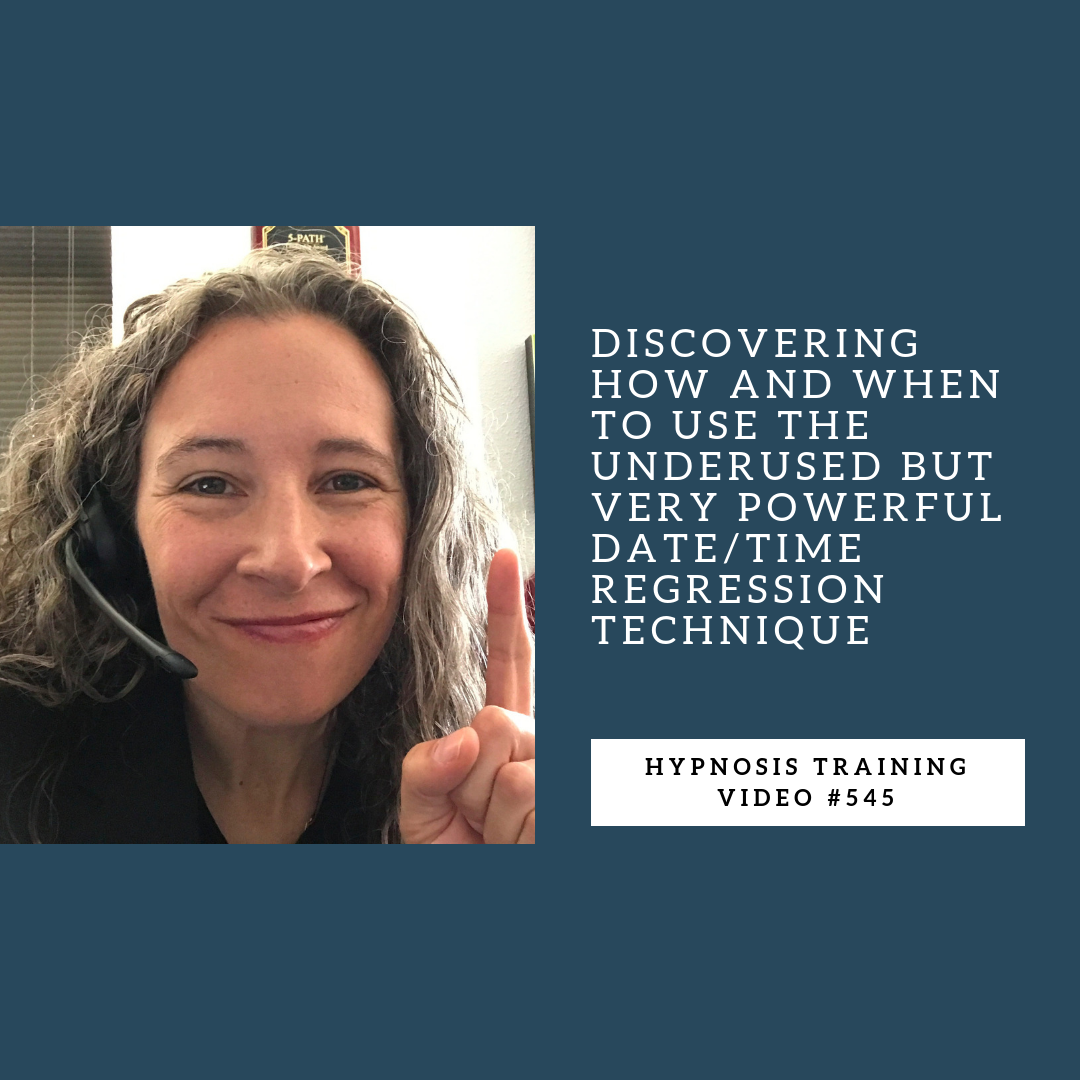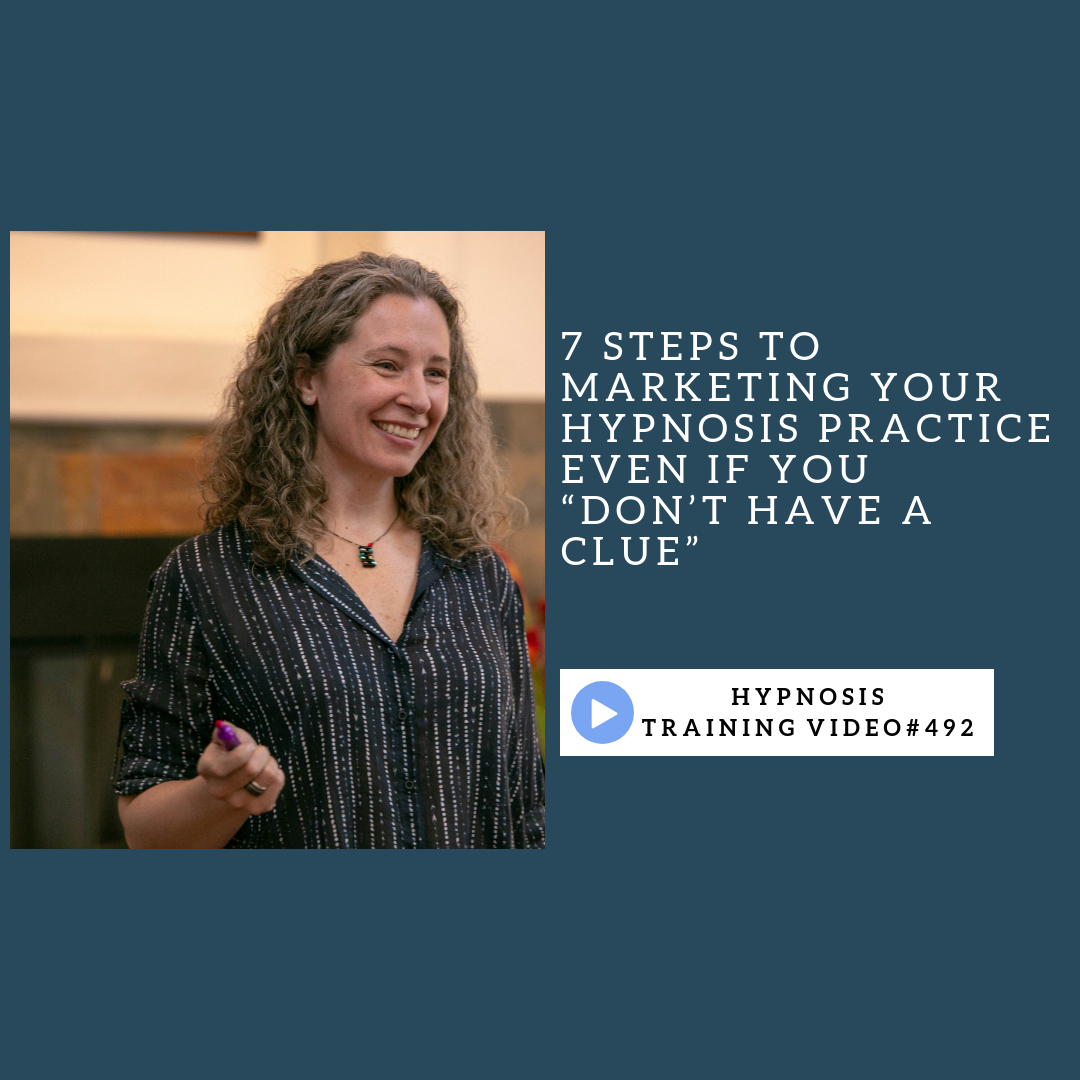Hypnosis Training Video #545: Discovering How and When to Use the Underused but very Powerful Date/Time Regression Technique


Erika Flint, BA, BCH, A+CPHI, OB

Cal Banyan, MA, BCH, CI, DNGH, OB, MCPHI
Discovering How and When to Use the Underused but very Powerful Date/Time Regression Technique
Carrie returned for her third session of hypnosis with a huge smile on her face, so I was surprised to hear her say “I drank again last week.”
Do you know the primary forms of Age Regression?
Affect Bridge: based on affect (a feeling). It's the most powerful and reliable.
Date/Time: based on a specific date and time, for example "last thursday", or "5th Grade Spelling Bee."
Symptom Bridge: headache, allergies, etc.
Cognitive Bridge: a thought - "I'm not good enough", "My brother always gets the attention."
I replied, “tell me about it.”
Carrie continued, “I got in an argument with my son in the morning and it bothered me all day at work. Without thinking about it, on the way home that day I stopped at the store again and bought a bottle of wine. A large one. By the next day, I felt terrible with the worst hangover ever. That’s why I’m smiling, because all the things we already worked on clicked, and I have no desire for alcohol, at all. I haven’t drank in over a week.”
Synopsis and Next Steps
Carrie had been drinking for over 40 years of her life. It started when she was in high school, just as a normal type of underage drinking. She never planned on it becoming an issue in her life, yet over the years she slowly drank more and more to the point that she was consuming a bottle of wine a day, and her family was worried about her. Her issues with her son were only made worse by her continued drinking.
Here’s a scenario where the client reports a recent “mistake” (a mis-take is just an opportunity to do it again, better - the next time). She believes she’s resolved the issue herself, based on insight and work from previous hypnosis sessions, yet taking your client’s word that the issue is resolved is not the best approach.
This is where Date/Time Age Regression really shines

Date/Time Age Regression: The What, and How
Here’s how Date/Time Age Regression can help clients with recent issues.
After inducing hypnosis with Carrie and ensuring she’s at the proper depth of hypnosis using a covert depth testing technique, I asked Carrie to return to last week - before she made the trip home to the store.
The trick here, is that you need to regress your client to the point before the decision to drink alcohol was made. If you regress your client to the point of drinking, you’re likely to miss the critical element that led to the mis-take. Also, keep in mind that for many clients with too-much behaviors (drinking, eating, smoking), they can have a pre-decision mental construct built in - meaning, when they [ feel a certain way] they [drink]. So for many clients, there technically is no conscious decision. Notice how Carrie mentioned “Without thinking about it, on the way home that day I stopped at the store.” This is very telling. It’s likely true that Carrie didn’t actually think about it - it was not a conscious decision. She felt bad, and just moved into an unconscious pattern of getting and consuming alcohol. Note that at this point we don’t know exactly how she felt so it’s just some level of bad - the regression will reveal the specific set of feelings and thoughts. Those feelings and thoughts are what we need to work with and resolve.
“ Date/Time Age Regression is a powerful method for helping your client resolve a recent experience in their life that is directly related to their issue. It’s powerful because of the law of recency - when we help our clients solve a recent issue, it’s meaningful to the mind, and often leads to permanent results..” ”
Next, I used specific language for Date/Time regression to bring Carrie to that important moment, “In a moment, I want you to go back to last week, before you decided to drink again. Before you left on the drive home.” Yes it can be that easy, when your client is in a state of somnambulism (which is a deep state of hypnosis where clients can revivify with their eyes closed), the subconscious mind knows exactly where to go.

After regressing your client to the point in time necessary to do the work, the next step is to build the model of the mind. The model of the mind is a technique to determine what was your client feeling, and thinking at that time. Those are the thoughts and feelings we need to work through with our clients in order to get them results.
With Carrie, she reported feeling angry and frustrated. Angry with her son for his behavior, and frustrated that it’s the same thing that keeps happening all over again. This blog article is not about dealing with relationship issues, however it’s important to note that relationships with other people are the #1 cause of stress. Whether it’s a boss, a spouse, an x, a child, a neighbor, whatever it is, humans relating to other humans is the most stressful for our hearts and minds. Carrie can’t control her son. She loves him, yet it’s frustrating he won’t follow through on his commitments and continues to be a difficult family member to live with.
After building the model of the mind, I worked with Carrie using a technique called The Informed Child Technique (ICT). This technique allows the client to determine - if they could do that event all over again, would they do it any different? For Carrie, her answer was yes - “I would have done one of the techniques you taught me to relax, instead of getting so upset throughout the day. Also, I would have gone kayaking after work, instead of not having anything to look forward to.”
Having a new solid plan, I had Carrie re-vivify the experience that day. Instead of getting upset with her son, she practiced a relaxation technique. She went on a walk at lunch, and after work, she went straight home with a plan to kayak on the lake she lived on. She did not drink, and more importantly, she was proud of herself and had a sense of accomplishment that she was able to have a great day and deal with the anger and frustration in a positive day. It didn’t ruin her day. Instead she felt empowered.
Date/Time Age Regression: The Why
The reason Date/Time Age Regression can be so powerful in this scenario is the principle of recency. The principle of recency states that the brain will prioritize and remember what happened most recently. Resolving this issue that happened one week ago for Carrie will be a powerful tool for her subconscious mind - not just in helping to resolve her issue with her son (which subsequently we resolved in Carrie’s next session), but even more importantly, for every other time she felt angry and frustrated. That’s the key - the Date/Time Age Regression work gave Carrie’s brain the expectation of success - not just about her son, but about any other time she feels angry and frustrated. Now she knows what to do. The technique interrupted and dismantled the pre-decision mental construct and destroyed it. Now Carrie will consciously make the decision to relax, and address the issue - instead of drinking.
Carrie’s Results
Carrie stopped drinking for good that week. She had an experience that made her never want to drink again, yet that’s not enough for long-term results. If we don’t resolve the original issue that led to the drinking, then it will just crop up at a later time during another unexpected and challenging situation. Watch the video below to discover this and the other powerful way to use Date/Time age regression - when paired with Parts Mediation Therapy.
Watch The Video Below To Learn “Discovering How and When to Use the Underused but very Powerful Date/Time Regression Technique”

The Meta-Message Of This Episode:
The underlying message of this episode is that Date/Time Age Regression is very powerful, and often underutilized. Learn how to use it in your practice to get great results for your client based on the principles of recency, and also deconstructing the pre-decision mental construct that many of our clients have installed.
From my heart to yours,



